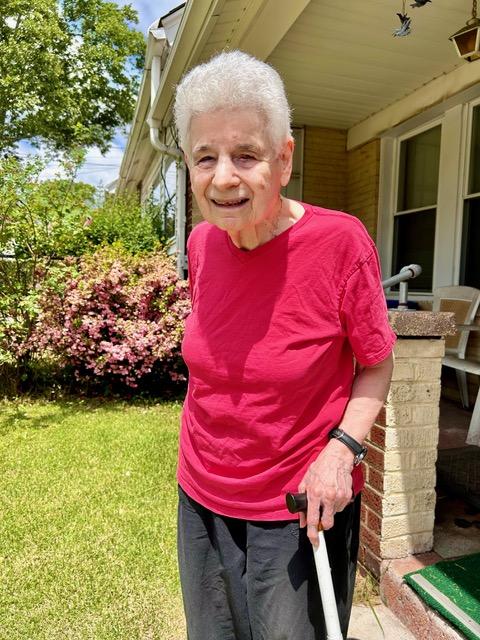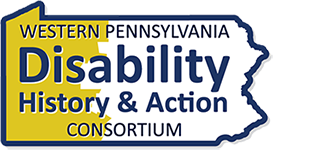
In May 2024, the Consortium had the pleasure of joining with Heinz History Center to record the oral history of Joyce Driben, a long-time social worker and disability rights advocate. Joyce’s personal experience with blindness influenced her long career of helping others in her adopted city of Pittsburgh.
Joyce, who is blind due to retinopathy of prematurity, was born in 1941 in the Dorchester neighborhood of Boston. She has a twin sister Sandra and a younger brother Elliott. She attended the renowned Perkins School for the Blind in Watertown, Massachusetts, through 12th grade. Perkins, founded in 1829, is the oldest school for the blind in the nation.
Joyce’s parents – Janet and Milton Driben – applied themselves to finding the best services and opportunities for Joyce and for her younger brother Elliott, who has a diagnosis of cerebral palsy. When a doctor told Janet and Milton about Perkins School for the Blind, they made sure Joyce enrolled. When Elliott was denied an education in the Boston school system as a first grader because of his disability, Janet and Milton made the difficult decision to uproot their family and move to Brookline, Massachusetts, where Elliott would be accepted into public school. The Dribens’ pursuit of an appropriate education for Elliott was no small feat in the early 1950s. The federal law that guaranteed the right to education to children with disabilities would not be enacted until 1975.
At Perkins, Joyce resided on campus during the week and came home on weekends. She recalls her years at the school as enjoyable, with a wide range of academic and recreational activities, including adaptive playgrounds and roller skating. Students learned to read, write and do math in Braille. Theater, choral music and music appreciation were important parts of the curriculum. Handcrafts such as knitting and ceramics were taught. “What Perkins did very well was teach us how to use our hands,” Joyce said.
Many of the staff at the school were blind, “so it was normalized,” Joyce said, adding that these teachers would often talk to students about their own school experiences at Perkins or in public schools.
A pivotal event occurred during Joyce’s high school years when she was introduced to a married couple – both graduates of Perkins – who had careers in the broader community. They were first blind adults she had ever met, outside of those who worked at the school. “They [became] very important to me and also to my family,” Joyce said. “I learned [that] blind people could have relationships, could get married, they could have Seeing Eye dogs, and they could have a career. I didn’t know that.”
Joyce graduated from Perkins in 1959 and began her studies at Brandeis University that fall. Joyce was intrigued by the prospect of attending a Jewish university after many years at Perkins, where she had been one of only a very few Jewish students. At the time, Massachusetts required one hour per week of religious education for residential students, and Perkins expected Joyce to participate in either the Catholic or Protestant class. Her parents, conservative Jews, declined. Her mother, along with a couple of other parents (one Protestant, one Catholic), successfully petitioned the Perkins administration to offer Jewish education. “It took a little work,” Joyce recalled.
At age 16, Joyce started taking lessons with a Hebrew teacher and found an organization that translated prayers into Braille. Her parents, who were deeply religious, were thrilled about her decision to attend Brandeis. Looking back at that moment in time, Joyce reflected on the way life often alters the best-laid plans: “I was going to major in Jewish history, Jewish subjects. But when I got to Brandeis, that was really not what I wanted to do.”
What Joyce found at Brandeis was “a very liberal school, and I met all kinds of people there who I’d never met before in my life. I had a lot more freedom than I had ever had.” The experience of living independently on a college campus, attending civil rights demonstrations, and being exposed to new ideas led Joyce to understand a long-standing tendency on the part of her parents and others to protect her. She realized: “I don’t want to continue in an environment where I can’t go do things I want to do. So that was the beginning of my thinking that I wanted to go to graduate school out of the Boston area.”
Joyce graduated from Brandeis in 1963 with a degree in psychology. As a blind student, she had faced numerous barriers in accessing her coursework, but always found the way forward. There were few accommodations for blind students at the time. “There were no [disability] procedures, no laws. I had to make my own way,” Joyce said.
Following her desire to venture far from home, Joyce applied and was accepted into the master’s degree program in the Social Work department at the University of Pittsburgh. She reflected on her naivete upon arrival to Pittsburgh: “When I came down to Pittsburgh with my first Seeing Eye dog, I did not have a clue about how I was going to get around.” She quickly found resources and helpful people, but had to solve a major problem before she could truly settle in.
Pitt had offered Joyce a room in one of its dormitories. However, two months before the start of the term, the university informed her that she could not live in the dormitory with a Seeing Eye dog. Seeking help, Joyce reached out to the Pittsburgh Association for the Blind, located on Craig Street near the Pitt campus. The director, Marcella Goldberg, was a no-nonsense advocate who promptly addressed the issue on Joyce’s behalf. Without further ado, Joyce and her Seeing Eye dog Spot, a black Lab mix with a single white spot on her chest, were moving into the dorm.
Joyce remained in Pittsburgh after graduating from Pitt. She worked as a social worker at the Child Guidance Center and Western Psychiatric Institute and Clinic at the University of Pittsburgh, and the Allegheny Neuropsychiatric Institute. She has been active in the Committee of Accessible Transportation (CAT), Blind Outdoor Leisure Development (BOLD), and Golden Triangle Council of the Blind. She has been a trainer on accessibility for Pittsburgh Regional Transit, and is an avid patron of the performing arts.
Throughout Joyce’s career and life, the theme of empowering others runs strongly. “What I found to be the most [satisfying] is really giving somebody a chance to maybe do something a little different that would make their lives better.”


